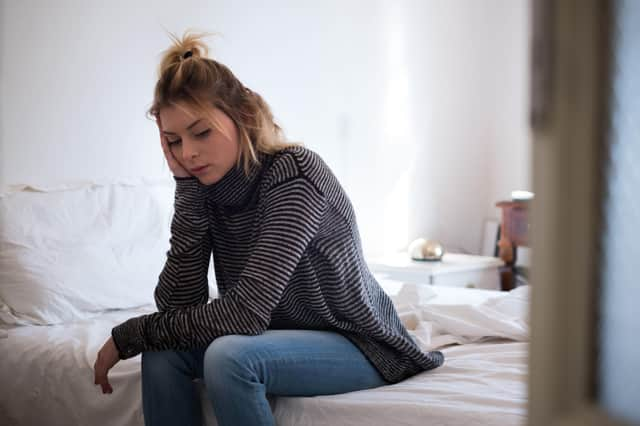People who catch Covid-19 ‘more likely to then suffer depression and anxiety’


Experts said the research backs up previous findings but has a longer follow-up, with people tracked for a year.
US researchers looked at data for 153,848 people who had experienced coronavirus and compared them with more than 560,000 with no history of Covid and a further large control group from before the pandemic.
Advertisement
Hide AdAdvertisement
Hide AdThe results showed that Covid-19 was associated with an increased risk of mental health problems, including anxiety, depression, substance use and sleep problems, up to a year after infection.
Compared with the non-infected group, people with Covid-19 showed a 60% higher risk of a mental health diagnosis or needing a mental health prescription at the one-year point.
Anxiety rates were 35% higher among those who had had Covid and 39% higher for depression. People were also 55% more likely to use anti-depressants.
Having had Covid meant the equivalent of an extra 24 per 1,000 people suffered a sleep disorder, an extra 15 per 1,000 had depressive disorders, and an extra four had substance use problems.
Advertisement
Hide AdAdvertisement
Hide AdSimilar results were found when the Covid-19 group was compared with the pre-pandemic group.
The risks were highest in people admitted to hospital but were still apparent in those who recovered at home.
Those with Covid-19 were also more likely to suffer mental health problems than patients with flu, while Covid patients who ended up in hospital were more likely to suffer mentally than those admitted for any other reason.
Researchers used data from the US Department of Veterans Affairs and published their work in the BMJ.
Advertisement
Hide AdAdvertisement
Hide AdMost of those in the study were men with an average age of 63.
The experts, including from Saint Louis University, concluded: “The findings suggest that people who survive the acute phase of Covid-19 are at increased risk of an array of incident mental health disorders.
“Tackling mental health disorders among survivors of Covid-19 should be a priority.”
Dr Max Taquet, senior research fellow at the University of Oxford, said: “While the data is limited to US veterans, other studies representative of the larger population have found similar findings.
Advertisement
Hide AdAdvertisement
Hide Ad“The fact that patients appear to still be at an increased risk 12 months after their Covid-19 diagnosis is concerning. But whether this represents delayed diagnoses or new onset of mental illness remains to be determined.”
Paul Harrison, professor of psychiatry at the University of Oxford, said: “The study builds on prior work of this kind, which had shown that Covid-19 is followed by an increased risk of common mental disorders, more so in those hospitalised during the acute infection.
“The main advance of this study is that it extends the follow-up period to 12 months.”
Dr Nilu Ahmed, behavioural psychologist at the University of Bristol, said: “The study strengthens the growing evidence base on the need to invest in mental health as part of strategies for social and economic recovery from the pandemic.
Advertisement
Hide AdAdvertisement
Hide Ad“We are still learning about the effects of long Covid, which is resulting in poor mental health as well as physical health, and this study adds to this by highlighting it is not just long Covid that increases the risk of mental health issues.”
Comment Guidelines
National World encourages reader discussion on our stories. User feedback, insights and back-and-forth exchanges add a rich layer of context to reporting. Please review our Community Guidelines before commenting.